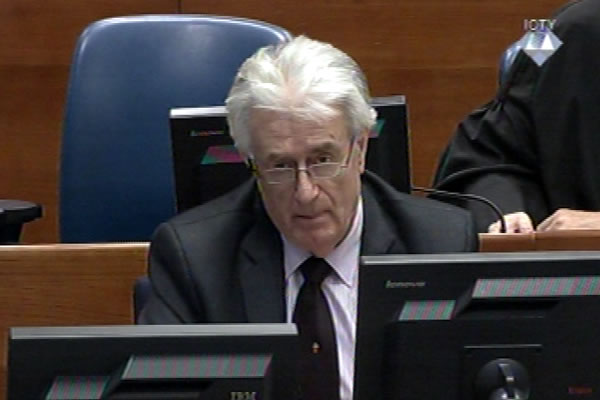Home
‘GENTLEMEN’S AGREEMENT’ MAY HELP KARADZIC
Radovan Karadzic’s motion to tender into evidence witnesses’ statements and other evidence on his alleged ‘gentlemen’s agreement’ with US diplomat Richard Holbrooke has been granted. Holbrooke purportedly promised Karadzic that the indictment against him in The Hague would be withdrawn in exchange for his retirement from political life. The evidence will be used only for the purpose of the sentencing
 Radovan Karadzic in the courtroom
Radovan Karadzic in the courtroom Judge Kwon’s Trial Chamber decided to admit into evidence the documents submitted by Radovan Karadzic’s defense relating to Karadzic’s purported agreement with US diplomat Richard Holbrooke. According to the accused, the documents may help him in the sentencing stage of the proceedings if the Trial Chamber finds him guilty on some or all counts in the indictment.
In July 1996, following Holbrooke’s meeting with Slobodan Milosevic in Belgrade, Radovan Karadzic signed a document in which he undertook to step down from the presidential and all other public offices in the Bosnian Serb government. Karadzic claims that there was an oral corollary to the written agreement: a ‘gentlemen’s agreement with Holbrooke, who promised Karadzic immunity from criminal prosecution before the Tribunal in The Hague. The agreement offered Karadzic guarantees that he would not be indicted by the Tribunal.
In Karadzic’s view, this may be of help to him in the sentencing stage of the proceedings against him, as the Tribunal then takes into consideration the behavior and actions of the accused after the war as a mitigating circumstance. The defense invoked the case of Dario Kordic where his voluntary abdication from political functions was taken in mitigation. The Tribunal did the same thing again in the cases against Biljana Plavsic and Milan Babic, where their peace efforts were used as mitigating circumstances in their sentencing. The Trial Chamber accepted the arguments of the accused and concluded that the documents pertaining to the alleged agreement with Holbrook will be relevant in sentencing.
Most of the admitted documents are statements made by the witnesses who were allegedly told by Karadzic in Pale that he had reached an agreement with Holbrooke which would result in the withdrawal of the indictment against him. The witnesses include Israeli businessmen Victor Ben Cnaan and Walter Hein, David Binder, a reporter for the New York Times, and Obrad Kesic, a US analyst of Serb descent. British major John Petrie from the Office of the High Representative in BH also claims that he was told at a meeting by Karadzic that he would not face prosecution.
The local witnesses include the closest relatives of the accused: his wife Ljiljana, daughter Sonja, son-in-law Branislav Jovicevic, his family friend Dragan Draskovic and a businessman from Pale, Punisa Lukic. All of them contend that Karadzic told them they needn’t worry about his arrest and extradition to The Hague. Parts from a book written by US professor Charles Ingrao are also among the admitted documents: in the book Ingrao investigated the allegations about the agreement with Holbrooke. There are also excerpts from the texts written by former Bosnian ambassador to the UN, Muhamed Sacirbej. He claims US diplomat Robert Frowick told him Karadzic wouldn’t go on trial in The Hague.
In addition to the documents about the purported agreement with Holbrooke, Karadzic tendered a letter from a prison guard in the UN Detention Unit. The guard describes the ‘good conduct’ of the accused in almost six years of his detention. The defense considers this fact could also be of help in the sentencing of the former Bosnian Serb president.
Linked Reports
- Case : Karadzic
- 2014-02-20 KARADZIC DECIDES NOT TO TESTIFY IN HIS OWN DEFENSE
- 2014-02-19 KARADZIC’S SWEET WITNESS
- 2014-02-18 KARADZIC’S THEORY ABOUT BODIES IN TOMASICA
- 2014-03-03 PROSECUTION WANTS TO FILE LONGER FINAL BRIEF BY 17 SEPTEMBER 2014
- 2014-03-05 PROSECUTION WANTS TO CALL 19 ADDITIONAL WITNESSES IN KARADZIC CASE
- 2014-03-14 AMERICA ACQUITTED OF KARADZIC’S ACCUSATIONS
